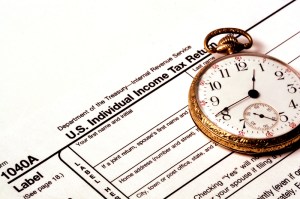 It’s only January, but April 15th (AKA: Tax Day) will be here before you know it. One of the smartest things you can do is begin to prepare everything you’ll need to file sooner rather than later. Here are a few places to start.
It’s only January, but April 15th (AKA: Tax Day) will be here before you know it. One of the smartest things you can do is begin to prepare everything you’ll need to file sooner rather than later. Here are a few places to start.
Get Your Personal Information Prepared: If the personal information on your tax forms isn’t correct, it can be a nightmare. Be sure you know your Social Security Number and that it appears correctly on your forms, and if applicable – your spouse and children’s Social Security Numbers as well. It’s also a good idea to keep last year’s return nearby in case you need it for reference and to ensure everything matches up.
Organize All Your Documents in One Place: Be sure you have access to all of this year’s income documents that you will need to file your return, and keep them in one spot (a file folder labeled for this tax season or a digital folder on your computer where all the documents are scanned in together). Documents you’ll need are your W-2, and any other sources of income like rental income, dividends, or unemployment. If you’re a homeowner with a mortgage, you’ll also want to have your mortgage interest statement available.
Keep Your Receipts: If you’re a small business owner or self-employed, you’ll need to file a Schedule C with all of your business expenses. Be sure you have kept your business receipts and expenses from the past year, and that you store them all together in a place where you can easily locate them to file this year.
Decide How You’ll File: Now is the time to choose between doing your taxes on your own or if you’d rather pay a professional. Decide now, because as it gets closer to April 15th – tax professionals may get backed up and not be available to file your return on time. If your taxes aren’t overly complicated and you decide to file on your own through TurboTax or H&R Block, First Financial members can save money as well as enter this year’s grand prize sweepstakes once you file!*
Need More Time? File an extension. If you don’t think you’ll have everything ready by April 15th, you can file for an extension with the IRS for October 15th. However, if you owe – you most likely will still need to pay what you’ll owe by the April 15th deadline. Learn more and complete the IRS tax extension form here.
Getting ready for tax season early will simplify the process as it draws closer to Tax Day. For more financial tips and resources, subscribe to our blog or monthly member e-newsletters.
*TurboTax Offer: Visit turbotax.intuit.com for TurboTax product guarantees and other important information. Limited time offer for TurboTax 2023. Savings are on TurboTax federal products only. Terms, conditions, features, availability, pricing, fees, service and support options subject to change without notice. Intuit, TurboTax and TurboTax Online, among others, are registered trademarks and/or service marks of Intuit Inc. in the United States and other countries. Other parties’ trademarks or service marks are the property of their respective owners. H&R Block Offer Void if sold, purchased, or transferred and where prohibited. No cash value. Valid at participating U.S. offices only. A new client is an individual who did not use H&R Block or Block Advisors office services to prepare their 2023 tax return. Discount valid only with or for preparation of an original 2023 personal income tax return. Coupon must be presented prior to completion of initial tax interview. Discount may not be combined with any other offer or promotion. Expires October 15, 2024. OBTP#13696-BR ©2023 HRB Tax Group, Inc. NO PURCHASE NECESSARY. Legal residents of the 50 United States (D.C.) 18 years or older who are members or employees of a U.S. credit union. Ends 4/15/24. To enter and for Official Rules, including odds and prize descriptions, visit https://taxservices.lovemycreditunion.org. Void where prohibited.





